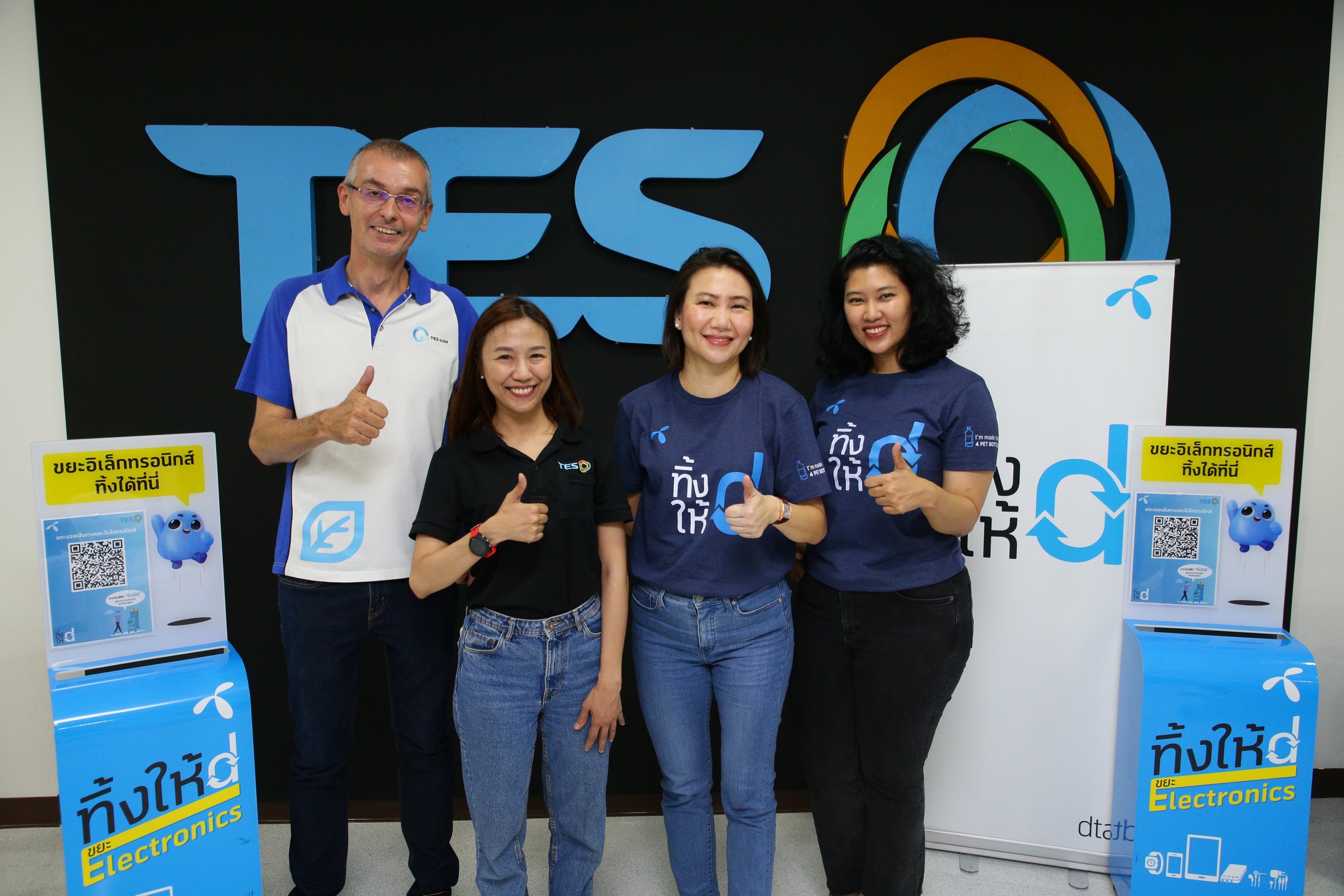Environmentally-friendly ambition kicks off with “Think Hai D” boxes to collect e-waste at dtac Hall shops nationwide
24 August 2020 – dtac has launched a nationwide campaign dubbed “Think Hai D” to collect electronic waste at its dtac Hall shops nationwide. The waste will be processed to international standards by TES, a global leader in e-waste recycling. The process is able to recover 96-98% of raw materials, including precious metals, before reintroducing them into the circular economy.
TES selected as “Think Hai D” e-waste recycling partner for responsible waste management
dtac conducted a comprehensive procurement process to select its recycler, assessing several risks such as good governance and environmental management. Prospective e-waste recycling partner have to go through an in-depth qualifying process which includes agreeing to dtac’s Agreement of Responsible Business Conduct. Candidates must also have a valid Department of Industrial Works factory license type-106 for proper e-waste recycling and disposal. Moreover, they must be certified to NIST 800-88R1 standard – one of the most widely used data sanitization standards for electronic devices. dtac has the Supply Chain Sustainability team who performs assessment and inspections over recyclers in the vendors list on an annual basis to ensure that they maintain their environment-friendly operations and in compliance with dtac’s standards.

The zero landfill journey starts with the blue “Think Hai D” e-waste disposal box
After TES picks up disused mobile phones and electronic devices from the dtac “Think Hai D” program, they will be carefully inspected at their facility. TES then makes an inventory detailing the number of items and the weight. The e-waste is then sorted into different categories such as mobile phones, batteries, earphones, charging cables and power banks. Items are then dismantled and parts are sorted according to their materials. The dismantled parts are then sent to a TES processing facility in Singapore to retrieve precious metals like gold, copper, palladium, iron, aluminum, lithium and plastics. The retrieved materials can then be used as raw materials in new manufacturing processes. Proper e-waste management contributes to preserving limited natural resources, reducing carbon footprints and achieving dtac’s goal of zero landfill.


Why it’s time to “Think Hai D” and think of e-waste
A survey by the Department of Environment on management of disused e-wastes found that over 50% of users sell their obsolete devices to waste buyers. These buyers dismantle the e-wastes and sell any retrievable parts. However, the remaining waste from their dismantling process is improperly disposed as general household trash. Improperly processed e-waste is a source of pollutants that contaminate the air, soil and water – impacting the health of nearby communities.

Mrs. On-uma Rerkpattanapipat, Senior Vice President – Communications and Sustainability Division of Total Access Communications PLC or dtac, said, “The dtac ‘Think Hai D’ program offers a convenient solution for those who want to properly dispose of their electronics like old mobile phones and accessories in a safe and environmentally-friendly way. As a major telecom operator, dtac sells hundreds of thousands of mobile devices each year. We aim to do business responsibly according to an Environmental and Climate Management System under the dtac sustainability policy.
Apart from our commitment to collect e-waste from consumers, dtac also responsibly manages e-waste generated from our own operations. dtac is committed to managing all collected and internally-produced e-waste with the target of zero landfill within 2022.”
dtac Think Hai D also manages waste from dtac’s operations
Most e-waste produced by telecom operations is from the network. In 2019, dtac collected a total of 213,476 pieces of e-waste: 21 percent came from general users, while 79 percent is from dtac’s network operations and expansion.
dtac is committed to managing e-waste produced internally, starting with storing collected e-waste in a warehouse where safety and security system aligns with the Department of Internal Trade Notification on Warehouse. This level of management ensures that the surrounding community will not be adversely affected should an unforeseen incident arise in the facility.
Internally produced e-waste also includes demo units and obsolete models of mobile phones and accessories. dtac has a specialist team to inspect these units and sort them for either reuse in various activities as appropriate or for proper disposal if they are no longer in working order. The electronics marked for disposal will be put through a proper disposal and recycling process by contracted e-waste recyclers.
For more information on “Think Hai d” please go to:
https://dtac.co.th/sustainability/ewaste/




About dtac
Total Access Communication PLC or dtac is a leading mobile operator in Thailand, providing 5G, 4G, 3G, and 2G services to approximately 19 million customers. dtac (Stock Exchange of Thailand symbol: DTAC) is committed to continually improving its mobile services, connecting its customers to what matters most, and empowering society. www.dtac.co.th.
About TES
TES is a global leader in environmentally-friendly electronic waste recycling. Certified to international standards and established in 2005, TES has operations at 38 locations in over 20 countries around the world. All the facilities are certified to ISO14001, OSHAH18001, ISO9001 and ISO27001. We focus on sustainable development and provide comprehensive electronic waste management services: data security, refurbishing and recycling. All services operate under our zero landfill policy.

